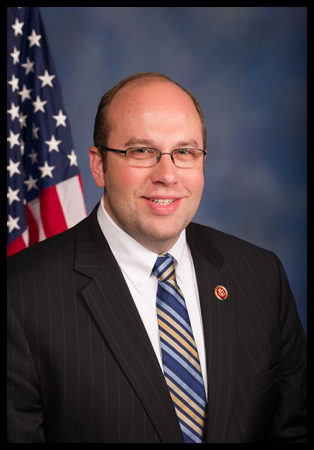
Dee Loflin, SMT Manager/Editor
Our Eighth Congressional District is home to some of the most naturally beautiful areas in the country. We are fortunate to have the Jacks Fork and Current Rivers that provide families with a place to canoe, swim, boat, and fish close to home. The rivers also support numerous small businesses that cater to the needs of visitors who come from far and wide to enjoy the clear waters and natural scenery.
In 1964 the National Park Service included the Jacks Fork and Current Rivers in the Ozark National Scenic Riverways with the goal of preserving access to the rivers. Over time however, the Park Service has systematically limited public access to numerous areas in our congressional district. Just last week the Parks Service released a new management plan that would shutdown public access points on the rivers, eliminate motorized boat traffic from certain areas, further restrict boat motor horsepower in other areas, close several gravel bars, and propose additional areas to be designated as federal wilderness.
The changes proposed by the Park Service would have a devastating impact on the economies of many communities in our Eighth District. Historically, individuals and businesses have been allowed to guide tourists through the riverways, and provide them with valuable services. These folks are the backbone of our local economy. Restricting access to the park and closing public access points are extreme measures that do not make sense. Preventing the use of motors on boats in certain areas, and limiting their power in others, will damage a local economy that is already the victim of burdensome federal regulations. The land use policies associated with Wilderness Areas are unwelcome additions to a park that is well functioning and beloved by those of us who grew up here.
To add insult to injury, the Park Service knew their planned management changes in the Ozark National Scenic Riverways would be met with opposition. As a member of the House Natural Resources Committee, I had the chance to question Secretary of the Interior Sally Jewell about the General Management Plan back in July. At that time I told Secretary Jewell that families in our district do not want further restrictions on their public lands and rivers. Despite my warning, further restrictions were included in the new management plan.
Generations of Missourians in our congressional district have enjoyed the Jacks Fork and Current Rivers. The rivers are also the engine that drives numerous small businesses. When bureaucrats in Washington try to restrict land and river usage for families and businesses, our district suffers. I hope residents across our Eighth District will join me in supporting access to our public lands and rivers.
This Week's Highlights
I had a blessed Veteran's Day at home in Missouri this year. I had the honor of celebrating with our nation's veterans in St. James, Jackson, Cape Girardeau and Bloomfield.
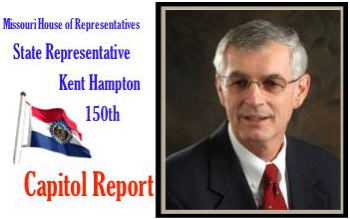
Submitted by
Dee Loflin, SMT Manager/Editor
Lincoln's Gettysburg Address
On November 19, 1863, at the dedication of a military cemetery at Gettysburg, Pennsylvania, during the American Civil War, President Abraham Lincoln delivers one of the most memorable speeches in American history. In just 272 words, Lincoln brilliantly and movingly reminded a war-weary public why the Union had to fight, and win, the Civil War.
The Battle of Gettysburg, fought some four months earlier, was the single bloodiest battle of the Civil War. Over the course of three days, more than 45,000 men were killed, injured, captured or went missing. The battle also proved to be the turning point of the war: General Robert E. Lee's defeat and retreat from Gettysburg marked the last Confederate invasion of Northern territory and the beginning of the Southern army's ultimate decline.
Charged by Pennsylvania's governor, Andrew Curtin, to care for the Gettysburg dead, an attorney named David Wills bought 17 acres of pasture to turn into a cemetery for the more than 7,500 who fell in battle. Wills invited Edward Everett, one of the most famous orators of the day, to deliver a speech at the cemetery's dedication. Almost as an afterthought, Wills also sent a letter to Lincoln—just two weeks before the ceremony—requesting "a few appropriate remarks" to consecrate the grounds.
At the dedication, the crowd listened for two hours to Everett before Lincoln spoke. Lincoln's address lasted just two or three minutes. The speech reflected his redefined belief that the Civil War was not just a fight to save the Union, but a struggle for freedom and equality for all, an idea Lincoln had not championed in the years leading up to the war. This was his stirring conclusion: "The world will little note, nor long remember what we say here, but it can never forget what they did here. It is for us the living, rather, to be dedicated here to the unfinished work which they who fought here have thus far so nobly advanced. It is rather for us to be here dedicated to the great task remaining before us—that from these honored dead we take increased devotion to that cause for which they gave the last full measure of devotion—that we here highly resolve that these dead shall not have died in vain—that this nation, under God, shall have a new birth of freedom—and that government of the people, by the people, for the people, shall not perish from the earth."
Reception of Lincoln's Gettysburg Address was initially mixed, divided strictly along partisan lines. Nevertheless, the "little speech," as he later called it, is thought by many today to be the most eloquent articulation of the democratic vision ever written.
Without a doubt the words President Lincoln spoke were sincere and heart driven, his acknowledgment that this nation was founded under the principals of God was most certainly true, and must continue to be true today. This great nation was not created by Democrats or Republicans, but “one nation under God”. The fox new special with Billy Graham, that aired on Thursday 11/7, was inspiration and timely, identifying to us that we are presently on a one way street, going the wrong way..See ya in church Sunday!
As always, it is an honor to serve you in the Missouri House. If you would like to discuss any issue, please call 573-751-3629. You can also email me at kent.hampton@house.mo.gov . I look forward to hearing from you.
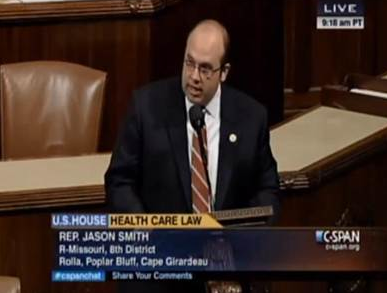
Dee Loflin, SMT Manager/Editor
Government Shutdown to the United States Treasury
As promised, Smith returned his congressional salary from the 16 days of the government shutdown
Washington D.C. - On Monday, November 4, 2013, Congressman Jason Smith returned his congressional salary from the 16 days of the government shutdown to the United States Treasury. In a letter to the United States House of Representatives Office of Finance, Smith asked that his salary from the shutdown be used towards a reduction in the national debt.
“Members of Congress are no better than anyone else. Families across the country faced furloughs because of the shutdown. In Missouri folks don’t get paid until the job is done. I returned my salary from the shutdown because Congress was not getting the job done,” said Smith. “On October 1st I told my constituents that I would have my congressional salary withheld during the government shutdown and then donate those funds back to the Treasury. Today I am making good on that promise and I am requesting my congressional salary from the 16 days of the shutdown be used to pay down the national debt.”
Click HERE to see Smith’s letter to requesting his salary be used to pay down the national debt.
During the government shutdown, Smith made a speech on the floor of the United States House of Representatives challenging his colleagues in the House and members of the Senate to also have their salary withheld during the shutdown. Over 100 Members of Congress joined Smith’s challenge.
Click HERE to watch Congressman Jason Smith's remarks urging his colleagues to refuse their congressional salary during the government shutdown.
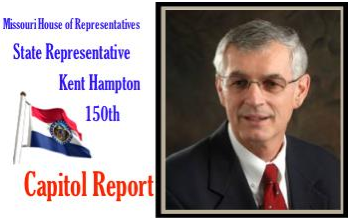
Submitted by
Dee Loflin, SMT Manager/Editor
Happy Anniversary Abraham Lincoln and Mary Anne Todd
On November 4th, 1842, struggling lawyer Abraham Lincoln marries Mary Anne Todd, a Kentucky native, at her sister's home in Springfield, Illinois.
Mary Todd, whose nickname was Molly, was the child of wealthy parents and received her education in prestigious all-girls schools where she excelled in cultural studies and the arts. Her father socialized with the politically influential and, as a result, she acquired a keen interest in politics. Molly met Lincoln in 1840 when she was 21 and he was 31. She fell in love with the tall, gangly and kind Lincoln and, despite her family's objections to his poverty and lack of political prospects, accepted his proposal of marriage. However, in early 1841, he inexplicably broke off their engagement. The split lasted until the fall of 1842, when they resumed their relationship. Some reports suggest they were reunited a year earlier but kept their relationship a secret. Regardless, after reuniting they wasted no time with a long engagement and were married on November 4.
Mary Todd, even more so than her husband, was a staunch abolitionist. She supported his political career as he rose from the Illinois legislature to become one of the country's most charismatic political orators to speak out against slavery. His views aroused the ire of southern slave-holding interests. Even early on in his career, Lincoln received death threats from pro-slavery southerners, and Mary Todd was labeled a traitor to her southern Kentucky roots. During the Civil War, she felt a deep sense of estrangement and tragedy; most of her male family members fought on the side of the Confederacy. To make matters worse, she was often criticized in newspapers and social circles for what was perceived as undue influence on her husband's political appointments. One reporter went so far as to blame Mrs. Lincoln for causing the president's health to deteriorate, giving him a gaunt frame and hollow cheeks. Those features were more likely caused by a debilitating wasting syndrome called Marfan's disease and the burden of governing a nation at war with itself.
During their marriage, a devoted Lincoln watched apprehensively as his dear wife developed illnesses and erratic behaviors, most likely in response to the death of their 11-year-old son Willie in 1862. She also suffered a head injury during a carriage accident in 1863 and thereafter complained of migraine headaches. Biographers and scholars have suggested that she suffered from severe depression and anxiety. (It is suspected Lincoln also suffered from depression.) On top of everything, after years of threats, her husband was indeed assassinated on April 14, 1865, while she sat next to him at Ford's Theater in Washington, D.C. It is perhaps not surprising in light of the deaths of her son and husband that Mary Todd developed a spiritualist philosophy that the living could communicate with dead.
After Lincoln's death, Mary Todd was forced to petition Congress for a widow's pension. The death of a second son, Tad, in 1871 threw her over the brink into insanity and she was placed in a mental institution by her son Robert. After two attempts at suicide, Mary Todd was released into the custody of her sister Elizabeth. She lived with Elizabeth in Springfield, Illinois (where her husband and son were buried), until her death in 1882 at the age of 63.
As we learned from this bit of history, women have and always have played a major role in the history of our nation. Whether it was the leading role or a strong supportive role in which they stayed strong in their beliefs and commitments. In closing I once again encourage you to know what you believe and believe what you know.
As always, it is an honor to serve you in the Missouri House. If you would like to discuss any issue, please call 573-751-3629. You can also email me at kent.hampton@house.mo.gov . I look forward to hearing from you.
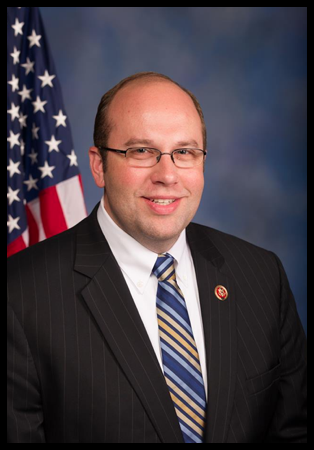
Submitted by
Dee Loflin, SMT Manager/Editor
Does Congress Live Under a Different Set of Rules?
When I am home in Missouri one of the most frequent complaints I hear about Congress is that its members live under a different set of rules than the rest of America. The idea that Members of Congress should be able to create special exemptions from themselves is not only unfair, it is contrary to the spirit of constitutionalism articulated by the Founding Fathers and reflected in our Constitution. As James Madison wrote in The Federalist No. 57, once it becomes acceptable "to tolerate a law not obligatory on the legislature, as well as on the people, the people will be prepared to tolerate anything but liberty." To ensure Washington politicians are treated no differently than the rest of America, I am announcing my support for a new amendment to our Constitution. The 28th amendment to the Constitution would read: Congress shall make no law respecting the citizens of the United States that does not also apply to the senators and representatives.
The amendment is based on the simple notion that Congress must live under the same laws as everybody else. If Congress imposes burdens on the American people as a whole, then members of Congress must also face those burdens. Put simply, Congress needs to start eating what they’re cooking. For people who believe in constitutional government, it just makes sense.
Recently over 100 Members of Congress, both Democrats and Republicans, joined with me in having their salaries withheld during the government shutdown. The principle behind the 28th Amendment, Congress should be treated no differently than anyone else, led me to have my salary withheld. Over 800,000 federal employees and countless private sector workers felt the pinch of the government shutdown. This week I wrote a personal check to the United States Treasury for the 16 days of the government shutdown. Back home in Missouri folks get paid once the job is done. I returned 16 days’ worth of my pay to the Treasury because Congress was not getting the job done during the shutdown.
From unconstitutional recess appointments to statutes that surpass the powers delegated to Congress, America is experiencing a breakdown in constitutional government. Those of us who believe that American exceptionalism is rooted in the unique nature of our founding principles must commit ourselves to upholding the intent of our founders and the integrity of our Constitution. The 28th amendment begins the process by striking a blow against the ruling-class mentality that has taken over Washington.

